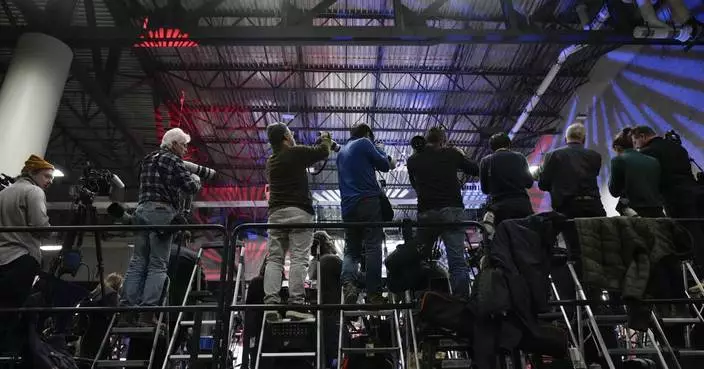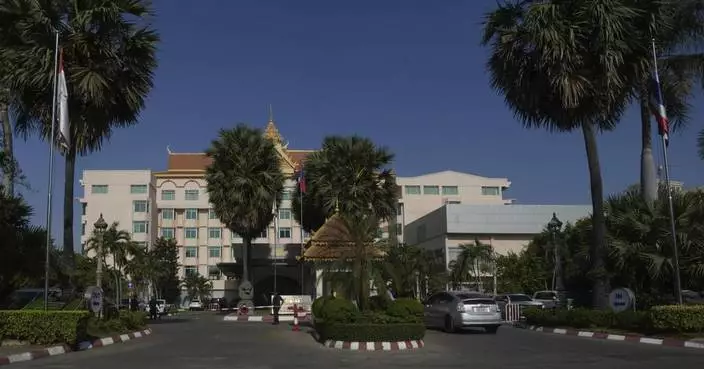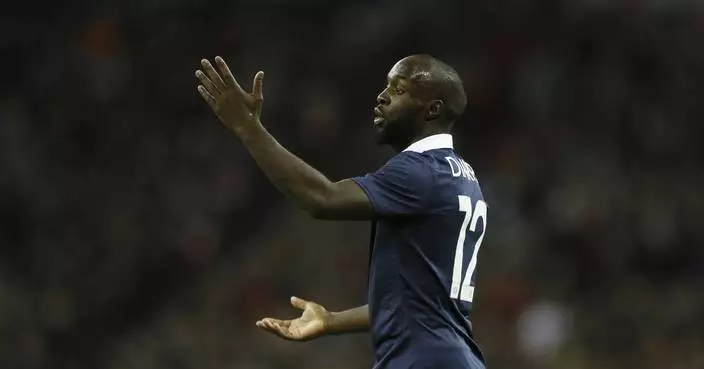A shooting in the French city of Strasbourg killed two people and wounded 11 others, officials said, sparking a broad lockdown and major security operation around a world-famous Christmas market Tuesday. Authorities said the shooter remains at large.
French prosecutors said a terrorism investigation was opened into the shooting, though authorities haven't announced a motive. It's unclear if the market — which was the nucleus of an al-Qaida plot in 2000 — was targeted. The city is also home to the European Parliament, which was locked down after the shooting.
The gunman has been identified and has a criminal record, according to Interior Minister Christophe Castaner. The prefect of the Strasbourg region says the gunman had been flagged as a suspected extremist.

Soldiers patrol in Strasbourg, eastern France, after a shooting Tuesday Dec.11, 2018. French prosecutors say a terror investigation has been opened into the shooting at a Christmas market in Strasbourg that has left two dead and up to eight wounded, including several in critical condition. (AP Photo)
The attack came as France has been wracked by four weeks of protests against President Emmanuel Macron, and police forces have been stretched by fighting rioting and other protest-related unrest. Macron himself adjourned a meeting at the presidential palace on Tuesday night to be able to monitor the events, his office said, indicating the gravity of the attack.
The interior minister and the Paris prosecutor, who is in charge of anti-terror probes in France, headed Tuesday night to Strasbourg. The prosecutor's office says the investigation is for murder and attempted murder in relation with a terrorist enterprise.
Several of the wounded are in critical condition, Castaner said.
In multiple neighborhoods of Strasbourg, the French Interior Ministry called on the public to remain indoors. French soldiers were on patrol after the shooting.
"Our security and rescue services are mobilized," Castaner said.
Local authorities tweeted for the public to "avoid the area of the police station," which is close to the city's Christmas market. Strasbourg's well-known market is set up around the city's cathedral during the Christmas period and becomes a major gathering place.
Images from the scene show police officers, police vehicles and barricades surrounding the sparkling lights of the market.
European Parliament spokesman Jaume Duch said that "the European Parliament has been closed and no one can leave until further notice." It wasn't immediately clear how many people were inside.
European Commission President Jean-Claude Juncker said that "my thoughts are with the victims of the shooting .... Strasbourg is like no other a city which is a symbol of peace and European democracy."
France has been hit by several extremist attacks, including the 2015 Paris shootings, which killed 130 people and wounded hundreds, and a truck attack in Nice that killed dozens in 2016.
Some Strasbourg residents have reported on social media that they heard gunfire in some parts of the city center.
Prime Minister Edouard Philippe tweeted that "the situation is still underway, priority is given to security forces and rescuers."
Strasbourg, about 500 kilometers (310 miles) east of Paris, is on the border with Germany.
The drama recalled a millennial terror plot on Strasbourg's Christmas market that still marks the collective memory. Ten suspected Islamic militants were convicted and sentenced to prison in December 2004 for their role in a plot to blow up the market on New Year's Eve 2000.
The Algerian and French-Algerian suspects — including an alleged associate of al-Qaida leader Osama bin Laden — went on trial in October on charges they were involved in the foiled plot for the attack.
They were sentenced to prison terms ranging from one to nine years.
BEIRUT (AP) — The European Union announced Thursday an aid package for Lebanon of 1 billion euros — about $1.06 billion — much of which will go to boost border control to halt the flow of asylum seekers and migrants from the small, crisis-wracked country across the Mediterranean Sea to Cyprus and Italy.
The deal follows other EU aid packages for countries such as Egypt, Tunisia and Mauritania to fortify their borders. It comes against a backdrop of increasing hostility toward Syrian refugees in Lebanon and a major surge in irregular migration of Syrian refugees from Lebanon to Cyprus.
European Union Commission President Ursula von der Leyen said during a Beirut visit with Cypriot President Nikos Christodoulides that the aid distribution will start this year and last till 2027.
The bulk of the aid — 736 million euros — would go to support Syrian refugees “and other vulnerable groups” in Lebanon, while 200 million euros are meant to bolster Lebanese security services in enforcing border and migration control, according to figures provided by the Cypriot government.
An unspecified amount would go to Lebanese fishermen, to discourage them from selling their boats to smugglers.
Von der Leyen said the EU will also work on a “more structured approach to voluntary return" of Syrian refugees "in close cooperation with” the U.N. refugee agency. The bloc will continue to maintain “legal pathways” for resettlement of refugees in Europe, she said.
Lebanon's caretaker Prime Minister Najib Mikati praised the package, saying that “Lebanon’s security is security for European countries and vice versa,” and that an escalation of the crisis ”will not be limited to Lebanon but will extend to Europe."
Lebanon, which has been in the throes of a severe financial crisis since 2019, hosts nearly 780,000 registered Syrian refugees and hundreds of thousands more who are unregistered, the world's highest refugee population per capita.
Lebanese political officials have for years urged the international community to resettle the refugees in other countries or assist their return to Syria — voluntarily or not. Lebanese security forces have stepped up deportations of Syrians over the past year.
Tensions further flared after an official with the Christian nationalist Lebanese Forces party, Pascal Suleiman, was killed last month in what military officials said was a botched carjacking by a Syrian gang. The incident prompted outbreaks of anti-Syrian violence by vigilante groups.
Meanwhile, Cypriot authorities complain the island nation has been overwhelmed by irregular migration of Syrian asylum seekers, many of them coming on boats from Lebanon.
The UNHCR in Lebanon said it had verified 59 “actual or attempted” departures by boats carrying a total of 3,191 passengers from Lebanon between January and mid-April, compared to three documented boat movements carrying 54 passengers in the same period last year. Usually, few boats attempt the much more dangerous crossing in the winter. In all of 2023, UNHCR recorded 65 boat departures carrying 3,927 passengers.
Cyprus has taken a new approach to halting the flow of migrants. Last month, it suspended processing of Syrian asylum applications, and human rights groups accused the Cypriot coast guard of forcibly turning back five boats carrying about 500 asylum seekers coming from Lebanon. Cypriot officials have denied this.
Bassel al-Shayoukh, a Syrian refugee from Idlib living in Lebanon since 2014, said his brother and several cousins and nephews were on one of the boats turned back. Now he wants to make the journey himself.
“In the beginning I thought that in a year or two the war would be over in Syria,” he said, but it dragged on, while in Lebanon “every year ... the situation began to get worse.”
Shayoukh said he fears being beaten by vigilantes or deported to Syria after Lebanese authorities declined to renew his residency permit.
His 17-year-old nephew, who declined to give his name fearing for his safety, said the Cypriot coast guard started making waves to push the boat he was on away. “I was terrified... I don’t know how to swim,” he said. “I thought we were going to die.”
The people on the boats “stayed three days without food or water” before turning back to Lebanon, the teen added.
Back in Lebanon, they were detained by the army; those registered with UNHCR were released and the others deported.
Mohammed Sablouh, a Lebanese human rights lawyer who works on refugee and migrant cases, says Lebanese authorities are deliberately “turning a blind eye" to the surge in migration to "pressure the international community.”
The Lebanese army did not respond to a request for comment on their measures to combat smuggling.
Thursday's aid announcement comes ahead of the annual fundraising conference for the Syrian crisis in Brussels later this month. After 13 years of civil war, donor fatigue has set in while the world’s attention is occupied by the humanitarian fallout of more recent conflicts in Ukraine and Gaza.
The Cypriot president said Thursday was a “historic day” and called for European officials to go farther and declare some areas of Syria safe for return.
“The current situation is not sustainable for Lebanon. It is not sustainable for Cyprus, it is not sustainable for the European Union,” Christodoulides said.
But not all Lebanese officials are convinced the European aid would solve the problem.
Lebanese Forces party head Samir Geagea told The Associated Press earlier this week that European authorities are mainly concerned “that the refugees don’t go to Europe."
"For us the problem is that we cannot have our country drowning in illegal Syrian refugees,” Geagea said, urging for Syrians to be sent back to either government or opposition-held areas of the neighboring country.
But Shayoukh says he has nowhere to go.
The Damascus government wants him for opposing Syrian President Bashar Assad, he said, while the Islamist group that now controls his hometown behaves "the same way as the regime’s intelligence services” in crushing dissidents.
Associated Press writer Menelaos Hadjicostis in Nicosia, Cyprus, contributed to this report.
Follow AP’s global migration coverage at: https://apnews.com/hub/migration

Lebanese caretaker Prime Minister Najib Mikati, center, speaks during his meeting with Cyprus' President Nikos Christodoulides, left, and President of the European Commission Ursula von der Leyen at the government palace in Beirut, Lebanon, Thursday, May 2, 2024. (AP Photo/Hassan Ammar)
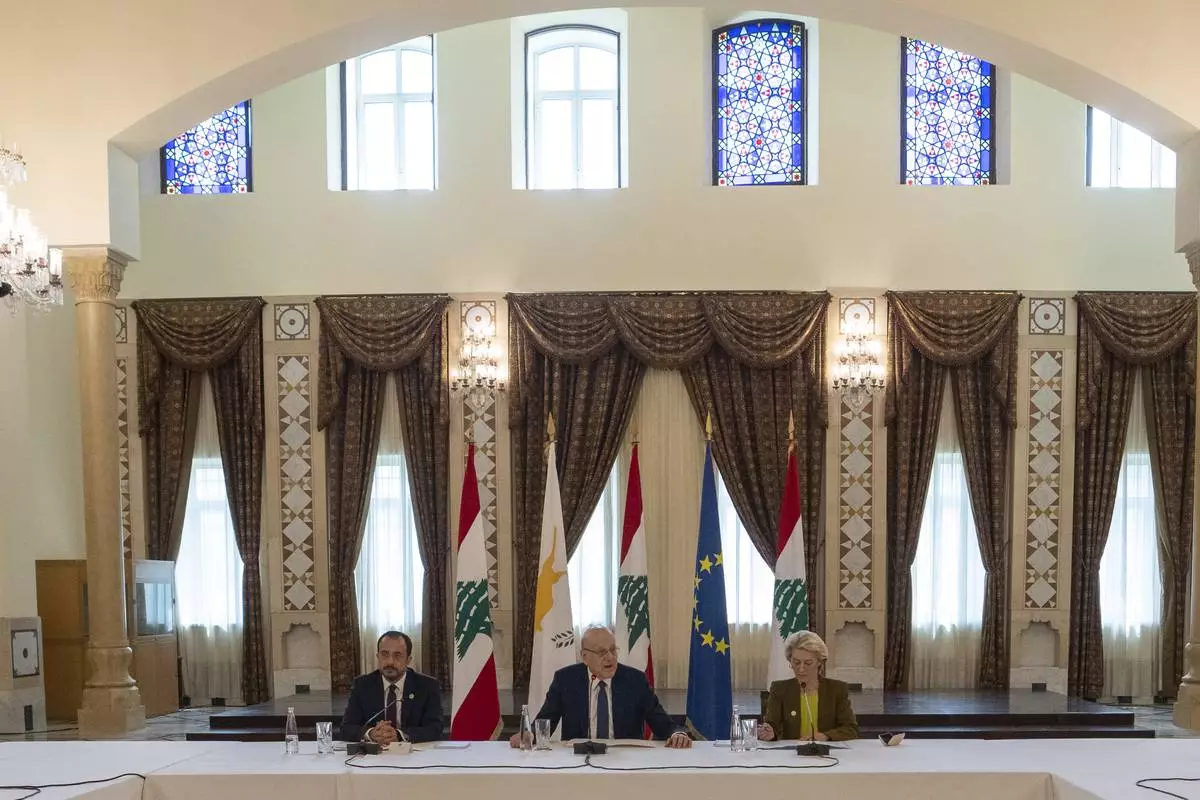
Lebanese caretaker Prime Minister Najib Mikati, center, speaks during his meeting with Cyprus' President Nikos Christodoulides, left, and President of the European Commission Ursula von der Leyen at the government palace in Beirut, Lebanon, Thursday, May 2, 2024. (AP Photo/Hassan Ammar)
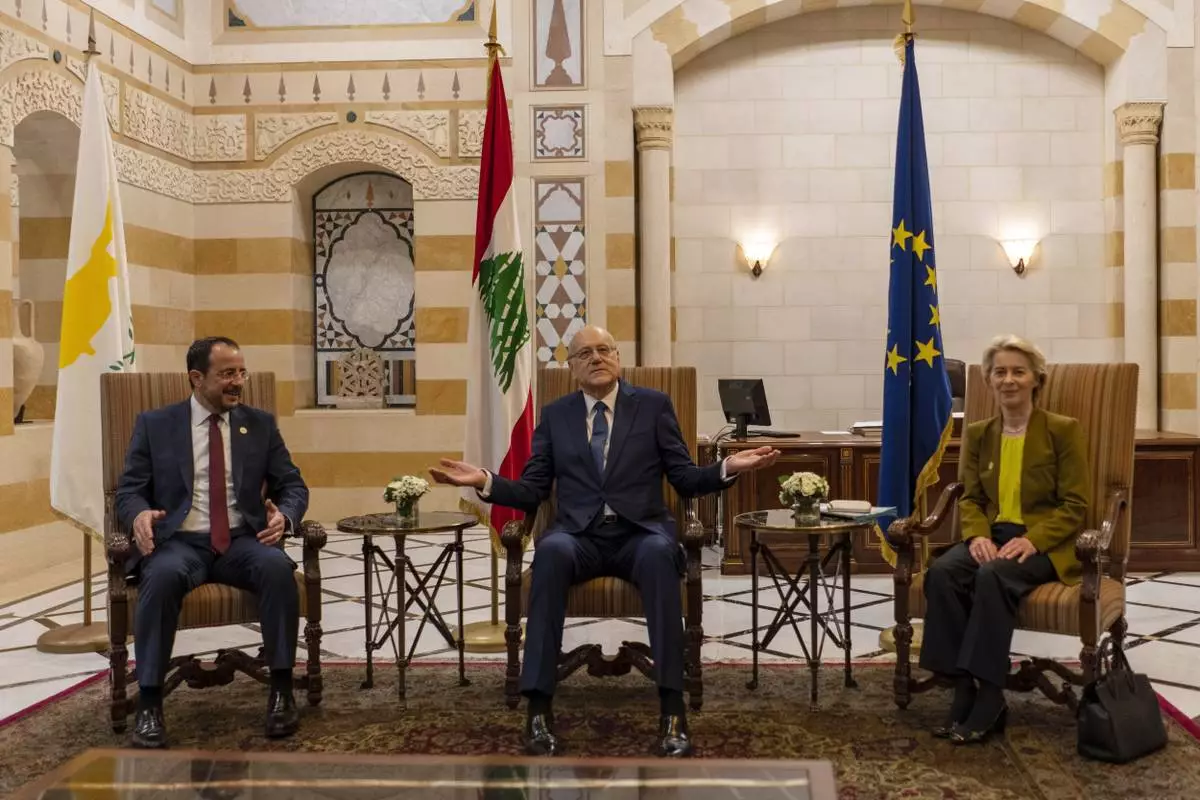
Lebanese caretaker Prime Minister Najib Mikati, center, welcomes Cyprus' president Nikos Christodoulides, left, and President of the European Commission Ursula von der Leyen before their meeting at the government palace in Beirut, Lebanon, Thursday, May 2, 2024. (AP Photo/Hassan Ammar)
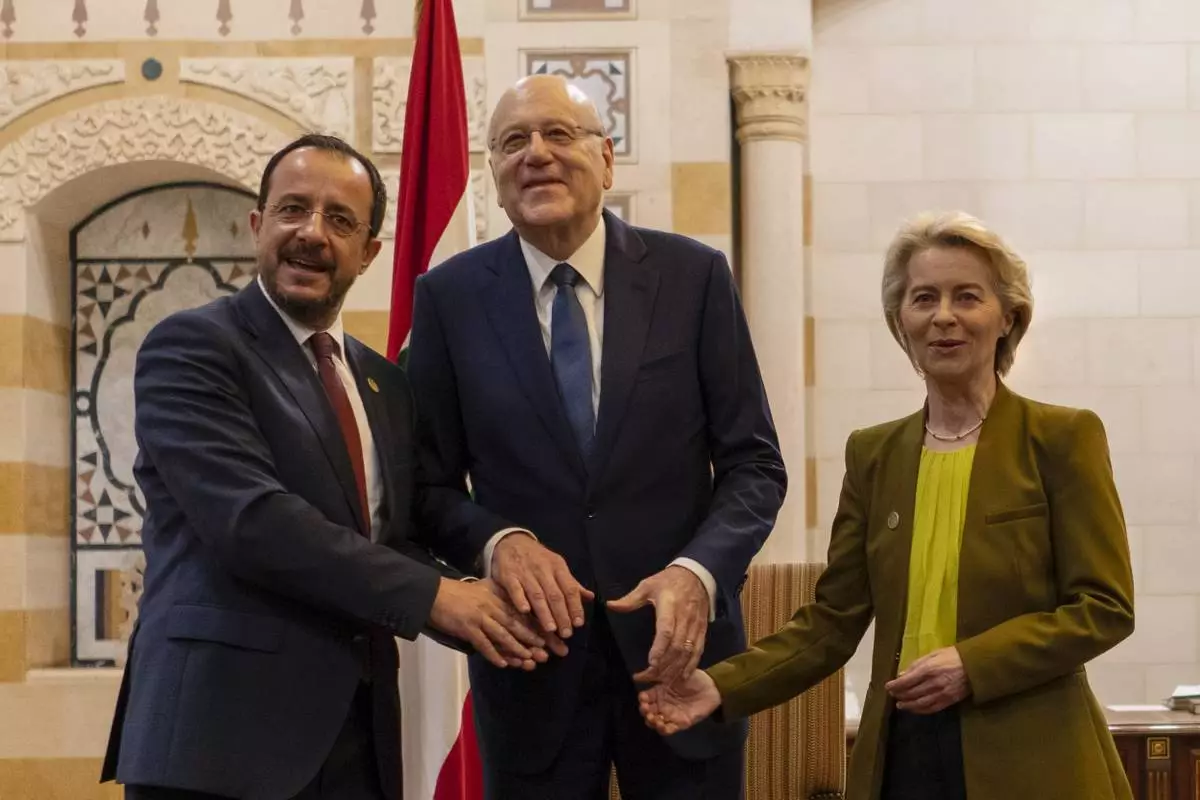
Lebanese caretaker Prime Minister Najib Mikati, center, Cyprus' President Nikos Christodoulides, left, and President of the European Commission Ursula von der Leyen pose for photograph at the government palace in Beirut, Lebanon, Thursday, May 2, 2024. (AP Photo/Hassan Ammar)
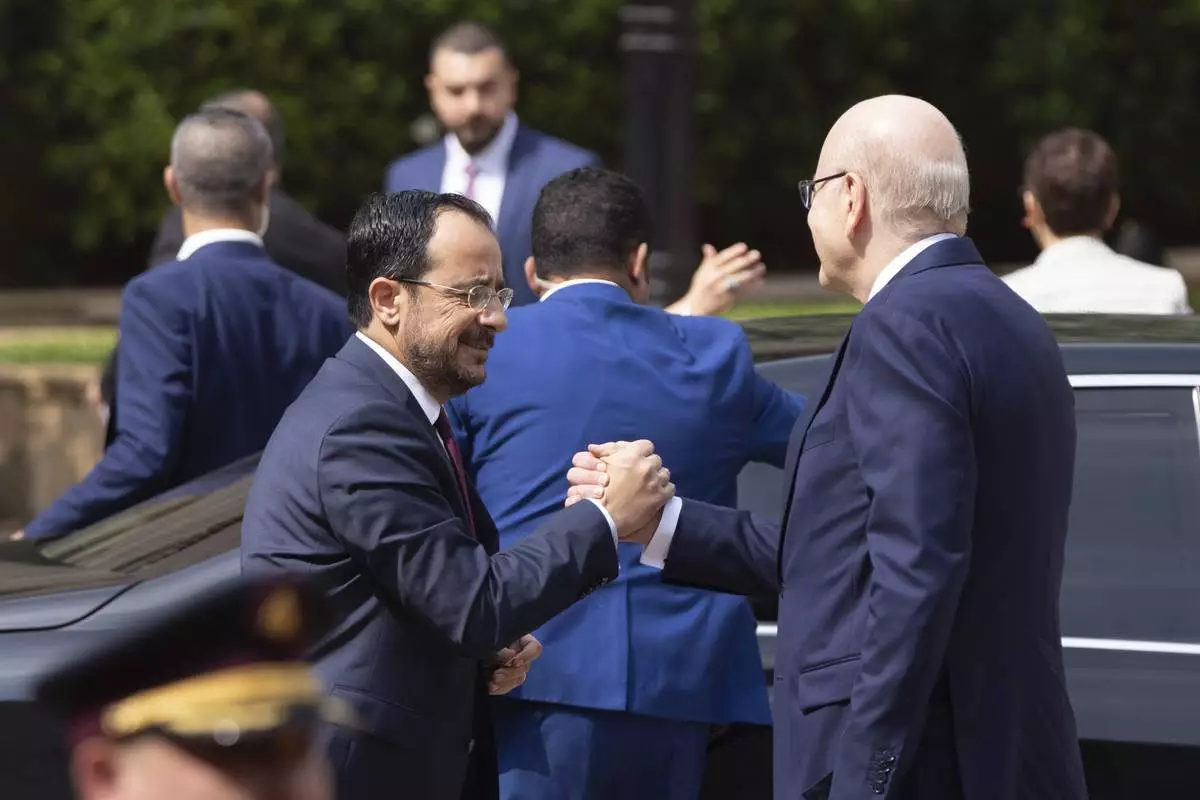
Lebanese caretaker Prime Minister Najib Mikati, right, welcomes Cyprus' president Nikos Christodoulides before their meeting at the government palace in Beirut, Lebanon, Thursday, May 2, 2024. (AP Photo/Hassan Ammar)

Cyprus' President Nikos Christodoulides, left, and President of the European Commission Ursula von der Leyen, center, review an honor guard upon their arrival to meet with the Lebanese Speaker Nabih Berri, in Beirut, Thursday, May 2, 2024. (AP Photo/Hussein Malla)

Lebanese caretaker Prime Minister Najib Mikati, center, speaks during his meeting with Cyprus' President Nikos Christodoulides, left, and President of the European Commission Ursula von der Leyen at the government palace in Beirut, Lebanon, Thursday, May 2, 2024. (AP Photo/Hassan Ammar)
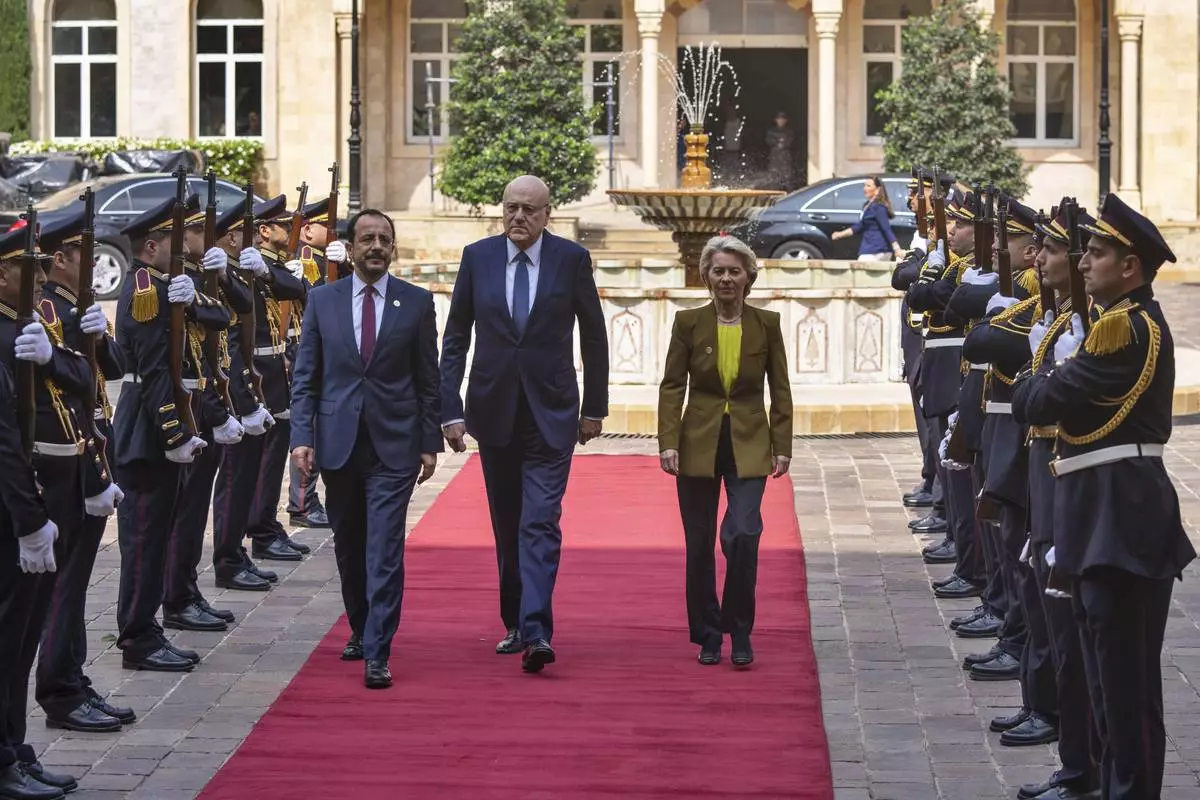
Lebanese caretaker Prime Minister Najib Mikati, center, welcomes Cyprus' President Nikos Christodoulides, left, and President of the European Commission Ursula von der Leyen at the government palace in Beirut, Lebanon, Thursday, May 2, 2024. (AP Photo/Hassan Ammar)












